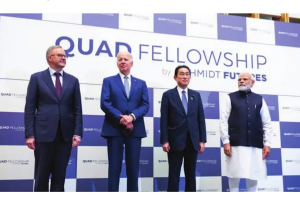The darkest places in hell are reserved for those who maintain their neutrality in times of moral crisis ~ Dante Alighieri, Italian National Epic Poet Let us start by calling a spade a spade. Over the last five to six decades, capitalism has been misused by its proponents, who regularly petition governments for subsidies, tax incentives and regulatory protection against competitors.
People professing to be pro-business are increasingly anti-free market and pro-cronyism. They encourage patronage rather than reward those who add value to the economy. There is no vision to create an abiding institution and no qualms in letting companies sink after money has been drawn out through questionable means. The reality is staring at us. Corporates must tie up their goals to the needs of the vast multitude of our underprivileged people, giving them work, so that they become the market for their products.
Henry Ford, in his 1926 book, ‘Today and Tomorrow’, asserted; “one’s own employees ought to be one’s own best customers”. In 1914, when he introduced the assembly line mass production of the iconic Model Ts, Ford doubled the salary of his employees. “We increased the buying power of our own people, and they increased the buying power of other people, and so on and on,” Ford wrote. That is enlightened vision!
A large portion of our economic growth in the last four decades has been in the services sector, predominantly the IT sector. Barring some of the large companies, most IT start-ups are platforms for aggregation of services, which essentially produce nothing and claim efficiency by pushing down the wages of workers and cutting into the profit margins of enterprises engaged in real, physical economic activity. What is also worrisome is that IT and social networking are perpetuating stereotypes, reinforcing perceptions and prejudices, instead of challenging them.
Emerging infotech is fuelling global inequality, while increasing social tension and dividing humans into hostile camps. People are being pushed into pigeonholes, where they can be classified and controlled. Super efficiency promised by IT and Apps is a chimera ~ it is bad for society. In a country which invests barely 3 per cent of its GDP in education, we have education departments buying smart boards, tablets and smart phones, when they can’t even pay salaries to their teachers.
Why do we need tutoring apps for children, when they can at most prepare the students for examinations and tests but not for life? As education becomes expensive and the digital divide deepens, the one and only honest way to upward social mobility is being denied to our poor and backward classes. We have world class technology institutes. They should be leading an industrial renaissance, but instead 80 per cent of our graduates become coders for the software industry. Even our ITI trained turners and fitters refuse to work on the shop floor. Should we blame them? No, not as long as a stockbroker earns more than an engineer and typing code is mistaken for technology.
A correction here can be a game changer. We need to realise that there is no role or need for the service sector unless we have robust and dynamic physical economic activity in the country. If the political and the corporate system are not delivering – what about the permanent civil service? The senior bureaucracy enjoys a secure working span of 30 to 35 years and can therefore think in the long term. The bureaucracy runs the government and has the executive powers to enforce the law. They have to build and sustain public institutions, work on capacity building, improving the quality of products and services in the MSME sector, setting up technology incubation centres, skilling, re-skilling and strengthening the health, education, sanitation and training infrastructure to energise small industrial units.
Instead, we see that even the regulatory role of the bureaucracy is getting compromised. Yes, there are black sheep in the bureaucracy, but the fact is that all government decisions are subject to oversight by Parliament and statutory audit by an autonomous constitutionally mandated CAG; RTI queries, public disclosure and judicial review are other powerful deterrents.
While petty corruption has continued as always, the last few decades have seen big corruption at higher levels. All these cases are linked to corporate entities, which have thrived under opaque decision making and hiding behind an audit system which is on their own pay roll. It was the oversight in the public sector which exposed the rot in the private sector.
The message is clear if we want to root out corruption, we must subject the private sector to the same kind of scrutiny as the public sector. All decisions, except on matters of national security, should, by law, be open to public scrutiny. Let us bite the bullet and see the dawn of a new India.
Talking of media, the crux of the matter is that information and questioning are the basis of democracy. Only intelligent people can ask questions while the others can be led like sheep through fake news and propaganda. Educated people are a threat to totalitarian regimes. Propaganda and fake news have traditionally been tools of non-conventional warfare. You use them in adversary nations to exploit their fault lines, to sow dissension and create confusion with the objective of undermining unfriendly regimes.
You never ever use it within your own country, where it eventually undermines the perpetrators. Pushing false narratives to a gullible and poorly educated public is not in the long-term interest of the nation. We need thinking people not compliant masses. So how do we break free of the many shackles created by vested interests and propagated by institutions controlled by them? How do we give power back to the masses and create an egalitarian society?
Since the problems and setbacks are many, we will need to prioritise. The top priorities have to be health, education, shelter and sanitation. These should be directly taken over by the governments, both at the centre and in the States. Budgetary allocation must go up and the prevalent laissez faire must stop. These areas are not for ‘for profit’ ventures. The private sector can play a role, but under absolute control of the governments.
There is no doubt that there are many genuine people who want to contribute in nation building. They must be provided space and due recognition. We, however, can no longer close our eyes to the misuse of opportunity by many others, which has been disastrous.
Simultaneously, we need to address the twin problems of reviving the economy and creating jobs. We need meaningful and productive jobs ~ jobs which provide self-worth. The way ahead is to integrate the masses with the mid and micro level enterprises, which should be seeded with finance and technology by the government, but run by small entrepreneurs, or the workers themselves.
The private sector and captains of industry should be encouraged to play their pivotal role as prime movers of the economy, but monopolies should be broken up. The difference between making profit and profiteering is simple. The latter has to be rejected by law.
Finally, India’s situation is not unique; the same ills can be seen across the globe. It is a larger pandemic waiting to explode. Let us take the corona crisis as nature’s warning to set our development model right. India should wake up.
(The writer is a former Chairman, Union Public Service Commission)











